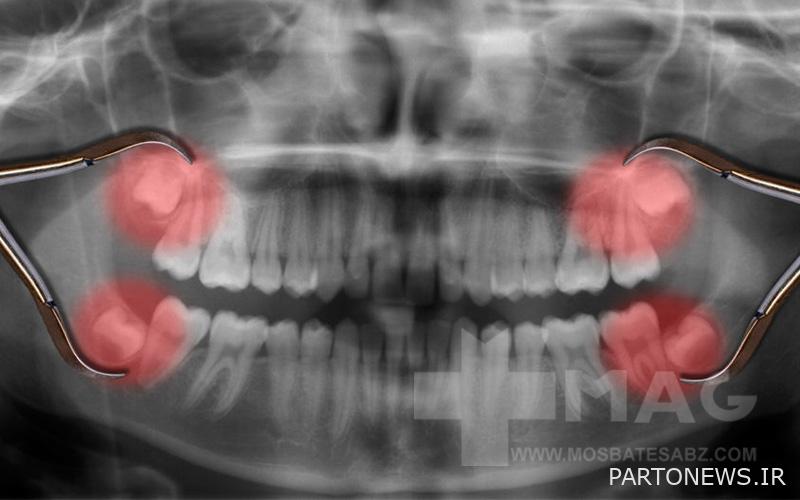Everything about wisdom teeth 🦷

The last teeth that grow in a person’s mouth are wisdom teeth. Most people experience the growth of their wisdom teeth between the ages of 17 and 25. Dentists call wisdom teeth, third molars or third molars. If the wisdom tooth does not have enough space to grow or suffers from pain and infection, it is necessary to perform surgery or extract it. In this article you will find complete information about wisdom teeth.
What we read in this article
What is a wisdom tooth?
The last part of the placement of the teeth in your mouth is dedicated to the place of the wisdom teeth. Sometimes the wisdom tooth grows properly and does not cause any problems, but in many cases, the wisdom tooth gets stuck in your gums or jawbone and stops growing. In this case, it is called a latent wisdom tooth.
An impacted wisdom tooth can lead to infection, cavities, gum disease, and other oral and dental problems. In this case, wisdom tooth extraction becomes necessary. It is interesting to know that some people do not have wisdom teeth at all. If so, this situation is normal and cannot be considered abnormal.
Where is the wisdom tooth?
Adults have 2 wisdom teeth in the upper jaw and 2 wisdom teeth in the lower jaw. That means, in total, each person can have 4 wisdom teeth. Wisdom teeth are the last teeth in the jaw arch. Right behind the second molars are the wisdom teeth. Of course, as we said, some people may not have wisdom teeth at all or the number of wisdom teeth in their mouths is less than 4.
Click to buy the best toothbrush.
Why do we have wisdom teeth?
What is the wisdom of the wisdom tooth? If the wisdom teeth grow on time and in their proper place, they can be effective in maintaining the jaw bone. In fact, the reason we have wisdom teeth may be related to the structure of the teeth of our distant ancestors. The story goes that our early ancestors’ diet consisted of a lot of raw plants, uncooked meats, and other hard foods. Chewing these foods requires a wide jaw and strong molars, and for this reason, having 3 sets of molars in the mouth of our early ancestors seems quite natural.
Nowadays, we can easily cook our food and eat it when it looks soft. For this reason, many dentists believe that wisdom teeth are no longer useful to us and there is no need to preserve them. In the course of human evolution, the jaws have become smaller, and for this reason, many people do not have enough space in their mouths for the growth of wisdom teeth, or their wisdom teeth are embedded or partially embedded.
The number of human wisdom teeth
The result of a research study showed that about 53% of the population has at least 1 wisdom tooth in their mouth. But some people don’t get their wisdom teeth at all.
What is the shape of a wisdom tooth?
Wisdom teeth are like any other molars. Most wisdom teeth have 2 to 3 roots, but some of them can even have 4 roots. The shape of wisdom tooth roots can vary from person to person. In most cases, the roots merge together to form the appearance of a large, cone-shaped root. In other cases the roots can twist or spread in different directions.
At what age do wisdom teeth grow?
Wisdom teeth usually grow between the ages of 17 and 25. But note that when you look inside your mouth, the wisdom tooth may be completely hidden and you may not see it.
Symptoms of wisdom teeth
The first signs that indicate wisdom teeth are:
- Redness or swelling in the gums behind the last molars
- Pain in the face due to wisdom teeth pressing on the nerves
- Pain in the jaw
- White spots behind the last molars (these spots are related to new teeth)
Check the price of toothpaste at the online positive green pharmacy and make your purchase with one click if you wish.
What are the benefits of wisdom teeth?
Wisdom teeth do not always need to be extracted or operated. In fact, when they do not cause problems, it is not necessary to try to remove them from the jaw. When the wisdom tooth does not have a negative effect on oral health, there is no need to do anything to remove it. Properly developed wisdom teeth can:
- Help a person chew food
- To play a role in correct speech and expressing the meaning of words
- Maintain the natural structure of the jaw
- They help to maintain the health of the bottom part of the mouth
So, if the wisdom tooth is healthy, fully grown and can be easily cleaned, it is not necessary to pull it.
Complications of wisdom teeth
Some people suffer from complications due to having embedded or semi-embedded wisdom teeth. These complications can include the following:
- wisdom tooth pain
- infection
- Create a hole in the gum
- Gum diseases and problems
- Damage to adjacent or lateral teeth
- creating a cyst
- Tumor development

Wisdom tooth extraction time
The dentist should determine the time for wisdom tooth extraction because it may vary from person to person. As we mentioned earlier, it is not necessary for all people to have their wisdom teeth removed. Some dentists believe that wisdom teeth should be removed before the age of 20 because they will have fewer complications. However, it seems that the best time to remove a wisdom tooth is when this tooth has caused a problem in the mouth or for other teeth.
wisdom tooth pain
Where does wisdom tooth pain go? Sometimes, wisdom tooth pain can be a sign of wisdom tooth eruption. When the tooth wants to erupt from the gum, it exerts a pressure that is accompanied by pain. But in many cases, the wisdom tooth is not at the right angle or gets stuck under the gum, in which case it is called a hidden wisdom tooth. Wisdom tooth pain usually affects the jaw and sometimes it will involve all the teeth inside the mouth. Wisdom tooth pain may cause swelling and pain around the jaw, inflammation and pain in the gums, or headaches.
Keeping wisdom teeth
You may ask, is there any benefit in keeping wisdom teeth? If the wisdom tooth is healthy, has enough space to grow and does not cause any problems in the mouth, you can keep it. Wisdom teeth can be effective in supporting the jaw. One theory is that people who don’t have wisdom teeth may experience the effects of aging earlier than others in their appearance. Also, keeping healthy wisdom teeth can increase chewing capacity for people.
It is also necessary to pay attention to the fact that some dentists also believe that keeping wisdom teeth is not the right thing to do and it eventually contributes to decay in the adjacent teeth. Finally, we must emphasize that you must consult a dentist about keeping or not keeping your wisdom teeth.
How to take care of wisdom teeth?
If you have a healthy wisdom tooth in your mouth, take the following steps to take care of it:
- Brush twice a day.
- Since wisdom teeth can be a bit difficult to access for cleaning, make sure you brush them.
- Floss after every meal.
- Use antibacterial mouthwash. Make sure your mouthwash is alcohol-free. Using mouthwash reduces the risk of tooth dryness and supports the health of all teeth.
Treatment of semi-implanted wisdom teeth
Partially impacted wisdom teeth may be a cause of infection in the mouth. When only a part of the tooth protrudes from the gum, a space is created around it, which is very suitable for the proliferation of bacteria. If a semi-implanted wisdom tooth becomes infected, sometimes it is enough to use antibiotics and mouthwash solutions for 7 to 10 days. If there is no recovery after this procedure, it is necessary to surgically remove the partially impacted wisdom tooth from the gum. The final decision for wisdom tooth treatment is always with your dentist.

Necessary care after semi-implanted wisdom tooth surgery
- For 1 hour, do not remove the sterile gauze that the dentist placed on the surgical site from your mouth to help stop the bleeding.
- If the dentist has prescribed a pain reliever, be sure to use it. Be careful that pain after wisdom tooth surgery is completely normal.
- Do not do heavy physical activity after wisdom tooth surgery so that the possibility of bleeding does not increase.
- Use a straw to drink liquids.
- Rinse your mouth with water and salt.
- Avoid eating solid foods for the first 24 hours. A few hours after the surgery, you can eat soft foods such as soup. Be careful not to consume the soup while it is hot because it increases the chance of bleeding.
We recommend reading this article: All About Fluoride Therapy for Children
The relationship between wisdom teeth and wisdom
Many people ask what is the relationship between wisdom teeth and wisdom. Is the appearance of wisdom teeth a sign of intelligence or intellectual growth? We have to say no; The name wisdom tooth is given only because this tooth grows in the mouth after the person is probably fully matured. So leave the idea that the wisdom tooth is an indicator of your intelligence and if it grows quickly, it means that you are smart! This is not the case at all.
Some people think that their wisdom teeth mean that they are wise, even though this tooth has caused problems and complications for them, they avoid pulling it or surgery! Leave these notions aside and consult an expert dentist.
A final word about wisdom teeth
In this article from the Green Positive Online Pharmacy magazine, we explained everything about wisdom teeth. If the wisdom tooth has caused complications in your mouth or for other teeth, be sure to have it pulled or operated. The information we provided in this article was general. You should get radiographs of your wisdom teeth and ask your dentist’s opinion about keeping the wisdom teeth or when to remove the wisdom teeth. We hope this article was useful for you.

